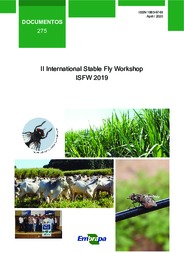Proceedings...
Proceedings...
Summary: The stable fly (Stomoxys calcitrans) is an economically important blood-sucking pest impacting animal production and welfare, as well as human beings, in countries from distinct continents. In recent decades, population explosions of this fly associated with agricultural production systems led to alarming infestations on both dairies and pastured cattle. Stable fly outbreaks are ultimately caused by the availability of suitable decaying vegetative material to support the development of massive numbers of immatures. This situation is becoming more frequent due to the industrialization of agriculture and the need for increasing food production around the world. The high intensity and extended duration of stable fly infestations have caused serious impacts on cattle production, resulting in social and economic conflicts between livestock producers and agricultural industries; relevant commodities and agricultural systems may vary from one country to another. This cosmopolitan fly has become an internationally important emerging pest and stands out among the most important livestock pests in many regions of the world including Australia, Brazil, Costa Rica, and USA. In addition to reducing the productivity of dairy and beef cattle, stable fly infestations also affect cattle reproduction and can ultimately result in mortality among livestock and companion animals. More efficient, cost-effective, practical and environmentally sustainable management approaches are needed for the control of this pest and prevention of outbreaks. In Brazil, stable fly outbreaks are mainly related to the production of ethanol from sugarcane; however, the use of in natura organic fertilizers (mainly poultry litter) in fruit, horticultural, and crop production systems also plays an important role. The complexity of this situation demands both economic resources and professional expertise. The first International Stable Fly Workshop (ISFW) held in Costa Rica in 2018 (April 16th-20h) addressed several issues related to stable fly outbreaks and led to the formation of the International Stable Fly Working Group (ISFWG). In this, the Second International Stable Fly Workshop (October 21st-25th, 2019), held in Brazil, we presented advances in research and management obtained during past 18 months and discussed plans and collaborations for the years to come, in addition to expanding and strengthening the working group. In response to the growing issues with stable flies, Workshop participants identified the following priorities: • Development of stable fly management plans suitable for relevant production systems; • Development of monitoring methods for both immature and adult stable flies which will support alert systems for decision making situations; • Establishment of extension programs to stimulate the engagement of professionals from agricultural and veterinary fields, as well as to train crop and livestock producers; • Development of a comprehensive and multidisciplinary stable fly research program; • Elaboration and implementation of public policies to effectively endorse the above suggestions. Furthermore, the ISFWG suggests that affected countries create a stable fly advisory board, which consisting of representatives from government, academia-scientific community, stakeholders representing crop and livestock producers, and affected communities.
Publication year: 2020
Types of publication: Annals and event proceedings (as a whole)
Unit: Embrapa Beef Cattle
Observation
Some of Embrapa's publications are published as ePub files. To read them, use or download one of the following free software options to your computer or mobile device. Android: Google Play Books; IOS: iBooks; Windows and Linux: Calibre.
Access other publications
Access the Agricultural Research Database (BDPA) to consult Embrapa's full library collection and records.
Visit Embrapa Bookstore to purchase books and other publications sold by Embrapa.

